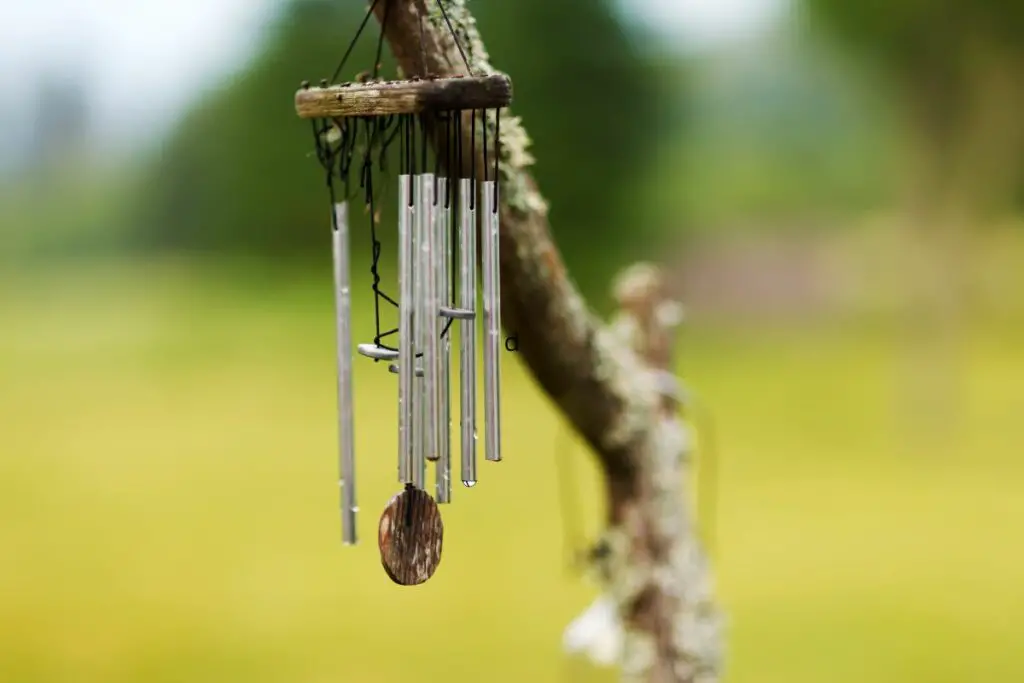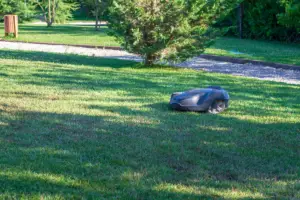Wind chimes are a beautiful addition to any outdoor space, but they can quickly become damaged by rust if not properly cared for.
To keep your wind chimes in good condition, you should keep them in a protected area, apply a clear coat of polyurethane or other protective sealants, clean them regularly with a solution of water and mild soap, and dry them thoroughly.
Additionally, you can apply a rust inhibitor, such as a wax or oil, and store the chimes indoors or in a dry place during the winter months.

Table of Contents
6 Steps To Prevent Wind Chimes From Rusting
By following these tips, you can ensure that your wind chimes will continue to chime beautifully for years to come.
To prevent wind chimes from rusting, you can do the following:
- Keep the chimes in a protected area, such as a covered porch or indoors.
- Apply a clear coat of polyurethane or other protective sealants to the chimes.
- Clean the chimes regularly with a solution of water and mild soap, and dry them thoroughly.
- Apply a rust inhibitor, such as a wax or oil, to the chimes to help protect them from moisture.
- Store the chimes indoors or in a dry place during the winter months to prevent rust from forming.
- Regularly check the chimes for rust and take action as soon as you notice any rust forming.
How do you get rust off windchimes?
There are several methods for removing rust from wind chimes, depending on the severity of the rust and the materials the chimes are made of. Here are a few options:
- Use a wire brush or steel wool to scrub away surface rust. This method is best for small areas of rust on metal chimes.
- Apply a rust remover solution to the rusted area. Follow the instructions on the product, but typically you’ll have to let it sit for a certain amount of time before scrubbing it off with a brush.
- Use a baking soda and water paste. Mix baking soda and water to make a paste, apply it to the rusted area and let it sit for several hours. Scrub the paste off with a brush.
- Try using lemon juice or white vinegar on a steel wool or aluminum foil. Rub the rusted area with the acid, it will help to dissolve the rust.
- For more severe rust, sandblasting or using a power tool such as a wire brush attachment on a drill may be necessary.
It’s important to note that some rust removers can be harmful to the environment and the surface they are applied to, so it’s important to read and follow the instructions on the product carefully and use protective gear if necessary.
Can You Leave Wind Chimes Outside In Winter?
Wind chimes can be left outside in the winter, but it’s important to take certain precautions to protect them from the elements. Cold temperatures and snow can cause the metal of the chimes to contract, which can lead to cracking and breaking.
Additionally, snow and ice can accumulate on the chimes, adding extra weight and stress. To protect your wind chimes in the winter, it’s a good idea to:
- Bring them inside: If possible, store the chimes indoors during the winter to protect them from the elements.
- Cover them: If you can’t bring the chimes inside, cover them with a waterproof tarp or other protective covering to keep snow and ice off of them.
- Apply a rust inhibitor: Apply a rust inhibitor such as a wax or oil to the chimes before the winter to help protect them from moisture.
- Keep them dry: Regularly check the chimes and make sure they are dry, if they are wet dry them as soon as possible.
- Consider the location: If the chimes are in an exposed area, they may be more vulnerable to the elements than if they were in a protected area.
By taking these precautions, you can help ensure that your wind chimes will be able to withstand the winter weather and continue to chime beautifully for years to come.
Conclusion
In conclusion, wind chimes can be left outside in the winter, but it’s important to take steps to protect them from the cold temperatures and snow.
To keep your wind chimes in good condition, you should store them indoors if possible, cover them with a waterproof tarp or other protective covering, apply a rust inhibitor before the winter, regularly check them to make sure they are dry, and consider the location where they are placed.
By following these tips, you can help ensure that your wind chimes will be able to withstand the winter weather and continue to chime beautifully for years to come.
- How to Build a Planter Box for Bamboo: A Step-by-Step Guide

- Can Robotic Lawnmowers Handle Steep Slopes?

- Do You Need a Specific Lawn for a Robotic Lawnmower? Expert Advice

- Are Robotic Lawnmowers Safe for Pets and Children? Safety Features of Robotic Lawnmowers

- Why Use Robotic Lawnmowers? Advantages of Using a Robotic Lawnmower

- Is the GARDENA SILENO City 300 Cordless or Corded? A Clear Answer














